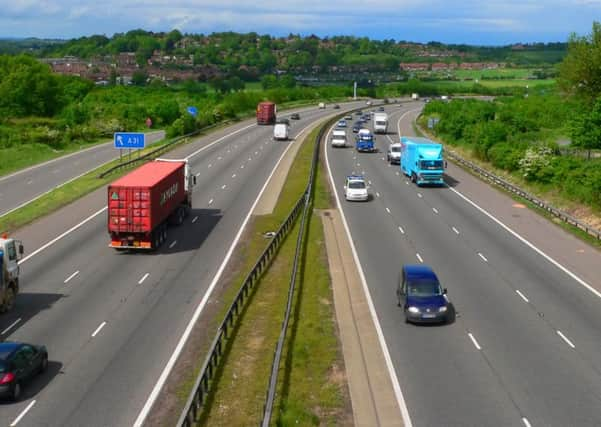Major overhaul in driver and motorcycle training by Government welcomed


The plans have been announced by Andrew Jones, transport minister, and include learner drivers being allowed on motorways for the first time, novice riders required to complete a theory test as part of their Compulsory Basic Training (CBT) and provisional motorcyclists to be banned after receiving six penalty points.
The Government says the changes will see competent learner drivers able to have lessons on motorways with an approved driving instructor in a dual controlled car.
Advertisement
Hide AdAdvertisement
Hide AdIn addition the CBT course, which allows motorcyclists to ride unaccompanied on Great Britain’s roads, will also be updated.
The transport minister said: “We have some of the safest roads in the world and we want to make them even safer. These changes will equip learners with a wider range of experience and greater skill set which will improve safety levels on our roads.”
The moves have been greeted by leading road safety charity, IAM RoadSmart, which has long campaigned for these changes.
Neil Greig, director of policy and research, said: “It makes no sense that new drivers learn by trial and, often fatal, error how to use our fastest and most important roads. Allowing learners on motorways with an approved instructor is a sensible and measured solution that should deliver drivers who are much better able to cope with complex new smart motorways.”
Advertisement
Hide AdAdvertisement
Hide AdOn the changes to motorcycle training, he said: “These proposals close two obvious loopholes that IAM RoadSmart has been highlighting with motorcycle industry training partners. A theory test should always be the first step for any motorised road user before they reach the road. The six penalty point approach also finally brings motorcycle users in line with the New Driver’s Act for car drivers.”
Gareth Llewellyn, Driver and Vehicle Standards Agency (DVSA) chief executive, said: “DVSA’s first priority is helping everyone stay safe on Britain’s roads.
“Our roads are amongst the safest in the world but we are determined to do more to improve safety for all road users including newly qualified drivers and motorcyclists.
“We want to modernise driver and motorcycle training so that novice drivers and riders gain the skills and knowledge they need to help them to stay safe on our roads.”
Advertisement
Hide AdAdvertisement
Hide AdOther changes to the motorcycle training include introducing a training course to allow existing riders to upgrade their licence and improving the way instructors are qualified and quality assured.
The Department for Transport (DfT) and the Driver and Vehicle Standards Agency (DVSA) have launched consultations seeking views on the measures to improve training for new drivers and motorcyclists. The consultations will run until 17 February 2017 and the changes could come into force in 2018.
Steve Gooding, RAC director, said: “The casualty statistics tell us that motorways are our safest roads, but they can feel anything but safe to a newly qualified driver heading down the slip road for the first time to join a fast moving, often heavy, flow of traffic.
“Many are so intimidated by the motorway environment that they choose instead to use statistically more dangerous roads, so we welcome this move which will help new drivers get the training they need to use motorways safely.”
Advertisement
Hide AdAdvertisement
Hide AdMr Gooding added: “This package of measures, taken together, should deliver a welcome streamlining of the process for qualifying as an instructor and improve both the content and administration of basic training for novice motorcycle riders.”
The Department for Transport and the Driver and Vehicle Standards Agency have jointly launched consultations seeking views, which will run until 17 February 2017.The changes could take effect by 2018.